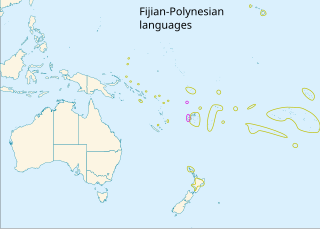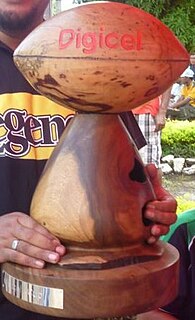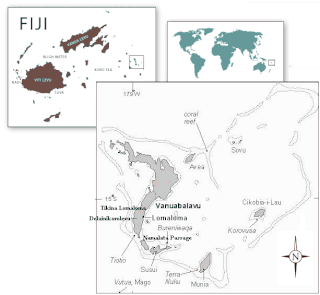George Speight, occasionally known as Ilikini Naitini, is a Fijian businessman. He was the leader of the Fiji coup of 2000, in which he and an elite unit of Fiji's military detained thirty-six members of parliament and held them hostage from May 19, 2000 to July 13, 2000. He is serving life imprisonment for his role in the coup.

The United Fiji Party was a political party in Fiji. It was founded in 2001 by Prime Minister Laisenia Qarase as a power base; it absorbed most of the Christian Democratic Alliance and other conservative groups, and its endorsement by the Great Council of Chiefs (Bose Levu Vakaturaga) caused it to be widely seen as the successor to the Alliance Party, the former ruling party that had dominated Fijian politics from the 1960s to the 1980s. It draws its support mainly from indigenous Fijiians.
Ro Lala, Lady Mara, maiden name Litia Cakobau Lalabalavu Katoafutoga Tuisawau was a Fijian chief, who was better known as the widow of Ratu Sir Kamisese Mara, modern Fiji's founding father who served for many years as Prime Minister and President of his country. As Fiji's First Lady, Adi Lala took on a diplomatic role, frequently representing her country abroad. She was regarded as a formidable and astute woman, whose influence on her husband was said to be considerable.
Burebasaga is the largest of the three confederacies that make up Fiji's House of Chiefs, to which all Fijian chiefs belong.

The family of Central Pacific or Central Oceanic languages, also known as Fijian–Polynesian, are a branch of the Oceanic languages.

The Central Division of Fiji is one of Fiji's four divisions. It consists of five provinces - Naitasiri, Namosi, Rewa, Serua and Tailevu.
Ted Young is a Fijian politician, who served in the Cabinet of Prime Minister Laisenia Qarase from 2001 to 2006. He was Minister for Regional Development from 2001 to 2006, when he became Minister of State for Provincial Development. He represented the Lomaivuna Namosi Kadavu Open Constituency, which he won on the Soqosoqo Duavata ni Lewenivanua (SDL) ticket in the general election of September 2001, defeating Samuela Nawalowalo of the Soqosoqo ni Vakavulewa ni Taukei (SVT). He had previously sought to win the seat at the 1999 election, for the Fijian Association Party (FAP), but was defeated by Konisi Yabaki of the Soqosoqo ni Vakavulewa ni Taukei (SVT)..
Naitasiri is one of the 14 provinces of Fiji and one of eight located on Viti Levu, Fiji's largest island.
Namosi is one of Fiji's fourteen provinces and one of eight based in Viti Levu, the largest island. Located to the west of Suva, the province covers 570 square kilometers. Its population of 7,871 at the 2017 census was the second smallest of any Fijian province.
Ro is a title used by Fijian chiefs in the Province of Rewa, as well as in areas of Naitasiri, Namosi, and Serua Provinces.
Konisi Tabu Yabaki was a Fijian politician from the southern Kadavu Island. He served in the Cabinet from 2000 to 2006, but lost his portfolios as Minister for Fisheries and Forests after the parliamentary election of 6–13 May 2006. He was subsequently appointed Chairman of the parliamentary committee on Social Services.

Ratu Suliano Matanitobua is a Fijian chief, member of the Parliament of Fiji, and former Cabinet Minister. He is a member of the Social Democratic Liberal Party.

The Skipper Cup is the Fiji Rugby Union's national provincial rugby union championship. The competition runs from May to September and is contested between the country's top 12 provincial sides. At the end of the competition the top 4 teams qualify for the semi-finals, with the winners moving on to the final. The competition has been sponsored by the phone company Digicel since 2008. Prior to that the trophy was called the Sanyo Cup.
Namosi-Naitasiri-Serua is an Oceanic language spoken in Fiji by about 1,600 people.
Fijian tradition and ceremony is a living way of life that has remained intact for millennia, evolving as the Fijian nation has modernised over time, with various external influences from Pacific neighbours, and European and Asian society. The term Fijian in this article refers to "indigenous Fijians" or "I Taukei" as the term Fijian generally includes all citizens of Fiji. This article is a general overview of various aspects of Fijian tradition, social structure and ceremony, much of it from the Bauan Fijian tradition. There are variations from province to province. Many social intricacies depend on one's inherited social position and the occasion one is confronted with: each will have a particular social etiquette. The Fijian terms in this article are most often of the Bauan dialect.

Turaga na Rasau is a traditional Fijian chiefly title of the Lau Islands. Prior to Fiji's colonial days, Fiji had many different Vanua with their own Paramount Chieftain which exercised no authority over the other; a saying from the island of Kadavu aptly summarises it "Nomu Turaga o sega na noqu Turaga" or "Your Chief is not my Chief" also the people of Beqa Island were of a similar opinion saying "Qali Cuva Ki Lagi" or "Subject only to heaven" and would bow to no outside Chieftain, but at the turn of the 20th century aspects of the traditional social structure remained, but for administrative purposes three main Matanitu were solidified and formed as they were the dominant consolidated powers at the time being that of Burebasaga, Kubuna and Tovata. With regard to the Rasau while its traditional origins were in Kubuna on Bau the titles traditional authority in modern Fiji is now in Tovata, Lau in particular Lomaloma Tikina on the Island of Vanua Balavu.

The Tui Namosi is a chiefly title held by the paramount chief of Namosi Province on the main island of Viti Levu, Fiji.
Taukei ni Waluvu is a Fijian phrase for "Native of the Flood." It is the traditional chiefly title of the warrior hill clan Siko-Natabutale of Nairukuruku village. The history of the clan from the mid- nineteenth century, represent the social structures of the chiefly system, religion and western culture that supported colonialism in Fiji. Tradition, Christianity and British indirect rule were combined to legitimize what was accepted as the right way to govern. Condemned by some modern day critics as exploitative, the Fijian chiefly system was the medium of native social interdependence and a traditional contract shared by the indigenous clans of pre-colonial Fiji, that was justly utilized for colonial rule. Since Independence the chiefly system has had to adapt to the demands of modernity. Anthropologist Arthur Capell in his study of early tribal migration within Fiji made the point that, "the history of Fiji is the history of chiefly families." The phrase in fact emphasized the hierarchical nature of Fijian traditional society where chiefly power was held sacred. The relationship between Chiefs and Westerners in especially Missionaries thus became a focal point for gathering insight into Fijian culture and tradition in the nineteenth century. James Turner a latter anthropologist found, "The chiefly families of Nairukuruku were the first in the eastern highlands of Viti Levu to declare their allegiance to the central government and as a result of this support their influence expanded throughout the area".
The Farebrother-Sullivan Trophy is a Fijian rugby union competition open to the regional representative teams of the districts of Fiji.









